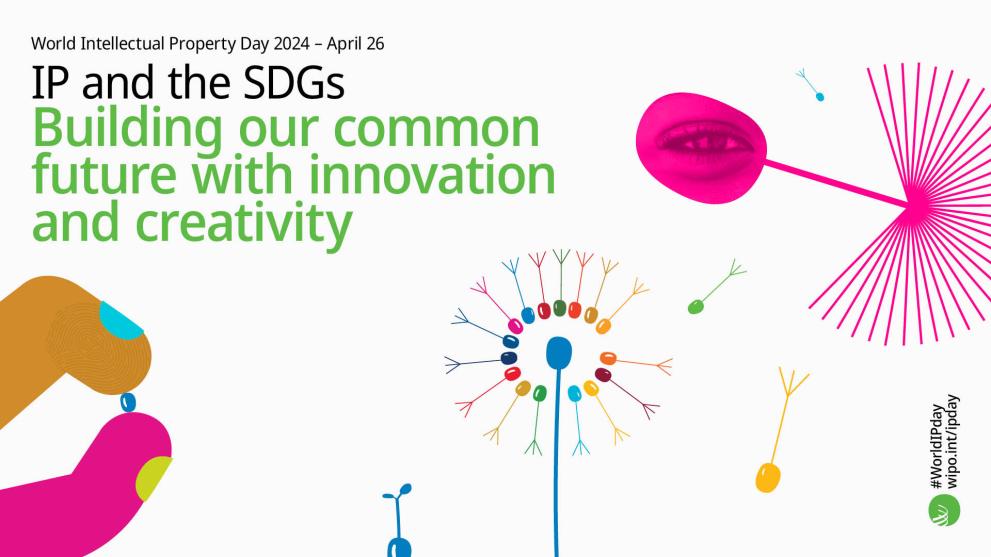
As every year, today April 26th 2024 is World Intellectual Property Day! This day has been chosen by the United Nations agency for intellectual property, the aptly named World Intellectual Property Organisation (WIPO) as the occasion to raise awareness about the role of intellectual property rights in fostering innovation and creativity, leading to a more developed, visionary and sustainable future. This date was chosen as the anniversary of the Agency, which was created on April 26th 1970. Every year, WIPO chooses a particular topic which reflects global challenges to highlight the central place which IP has in the modern world. Examples of past topics include IP and SMEs, Greent Future and Digital Creativity.
This year, the topic chosen by WIPO is IP and the SDGs, Building our common future with innovation and creativity. The SDGs are the Sustainable Development Goals adopted by the UN which constitute 17 pillars towards a better future for people and the planet, each focusing on specific issues to be tackled, ranging from access to education to protection of the environment. The goals are:
- No poverty (SGD1)
- Zero hunger (SDG2)
- Good health and well-being (SDG3)
- Access to quality education (SDG4)
- Gender equality (SDG5)
- Access to water and sanitation (SDG6)
- Affordable and clean energy (SDG7)
- Opportunities for work and economic growth (SDG8)
- Industry, innovation and infrastructure (SDG9)
- The reduction of inequalities (SDG10)
- Sustainable cities and communities (SDG11),
- Responsible consumption and production (SDG12)
- Action against climate change (SDG13)
- Conservation of marine life and sustainable fishing (SDG14)
- Protection of ecosystems on land (SDG15)
- Peace, justice and strong institutions (SDG16)
- Collaboration for reaching these goals (SDG17).
This year, WIPO has therefore chosen to celebrate World IP Day and to highlight the relevance and role of intellectual property in achieving these goals.
While IP can contribute, in one way or another, directly or indirectly, to many of these goals, it is probably in relation to SDG 9, focusing on the fostering of innovation and promotion of sustainable industrialisation that the role of intellectual property rights is the clearest. Indeed, at its very core the intellectual property system serves a role in society of both an incentive to and tool for cooperation in the field of innovation.
Incentivising Innovation: Intellectual property rights, such as patents, copyrights, and trademarks, provide an exclusive right and legal protection for innovators over their intellectual creations, be these inventions, original works or sets of data, information and know-how compiled and generated through their own labour. These exclusive rights in turn provide creators the opportunity to exploit their creations, generating an important incentive to invest in research, development, and creative endeavours. Without this legal protection against copying, the risk/reward balance involved in innovation would be tipped against creating and investing into innovative ideas: why spend time, money and effort to develop new ideas, products and inventions if others can then just copy you without having to face any of the costs you had to endure? In short, IP rights foster a culture of innovation and entrepreneurship, driving technological advancements and economic growth within industries.
Promoting Investment in innovative research and infrastructure: In the same vein, strong intellectual property protections create a favourable environment for investment in infrastructure projects and technological development. Investors are more likely to fund infrastructure projects when they have confidence that intellectual property rights will be respected and safeguarded, reducing the risks associated with innovation and investment.
Fostering Collaboration and Knowledge Sharing: Although intellectual property rights afford creators and inventors exclusive ownership over their innovations, they simultaneously foster collaboration and knowledge exchange through avenues such as patent pooling, open innovation, and research partnerships. These rights facilitate the global transfer of technology and expertise across borders and industries. Through mechanisms like licensing agreements and technology transfer arrangements, innovations are disseminated to enhance industrial processes, and infrastructure, and tackle developmental hurdles in sectors like manufacturing, energy, and transportation. By promoting the exchange of ideas and technologies, intellectual property rights empower stakeholders to collaboratively tackle intricate challenges and expedite progress towards fulfilling the objectives outlined in SDG 9.
In summary, intellectual property rights act as a catalyst for innovation and technological development, all of which lead to greater infrastructure investment. These same features also contribute directly to the attainment of other Sustainable Development Goals: they incentivise innovation in agriculture and food production (SDG 2), pharmaceuticals and medical advancement (SDG 3), access to clean water through water extracting and cleaning technologies (SDG 6), renewable energy sources (SDG 7), urban infrastructure (SDG 11), and climate-friendly technologies (SDG 13).
While it should be borne in mind that intellectual property rights are not the one and only tool which can lead to the attainment of these Sustainable Development Goals (and indeed some argue that intellectual property rights, through the exclusive rights they grant, actually act as a barrier to collaboration and access to new technologies), they nevertheless are an important means through which they can be reached. We warmly invite you to read through several concrete examples of how intellectual property rights contribute to this contained in WIPO’s dedicated page here: https://www.wipo.int/sdgs/en/story.html
Details
- Publication date
- 26 April 2024
- Author
- European Innovation Council and SMEs Executive Agency
